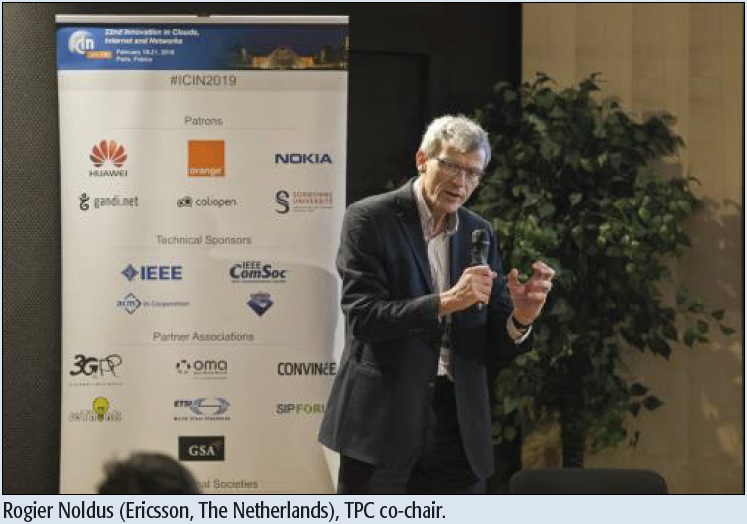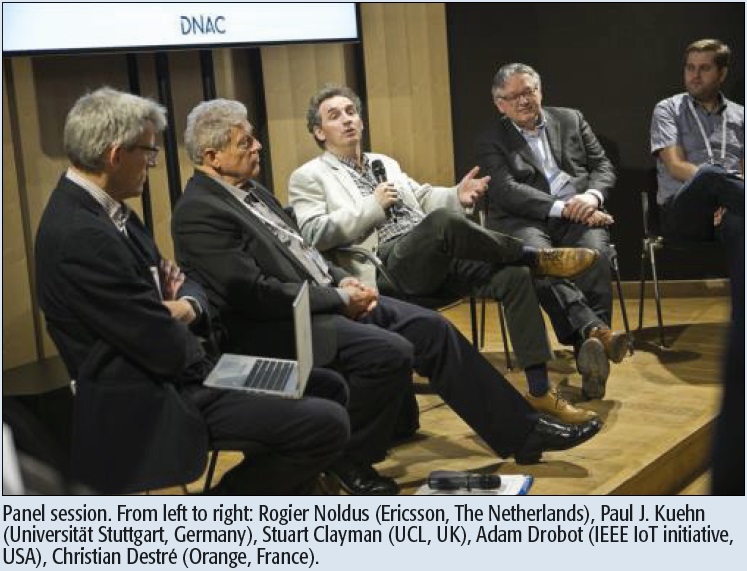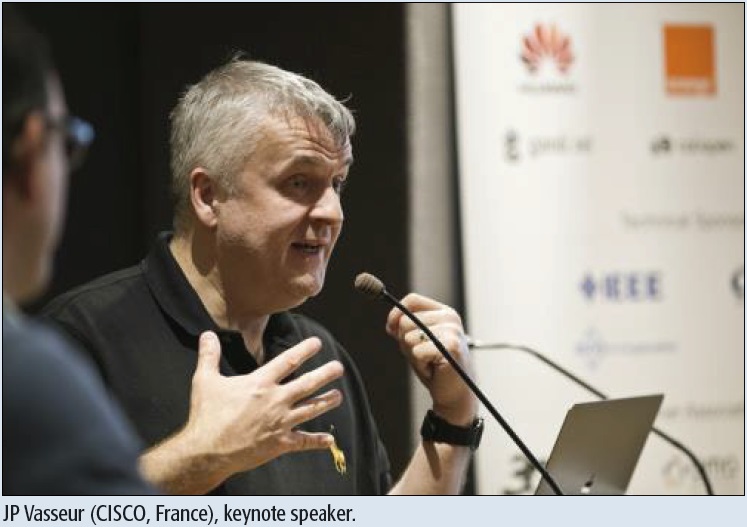
ICIN 2019, the 22nd edition of the ICIN conference series, took place on 19-21 February, in Paris, France. It was technically co-sponsored by IEEE ComSoc and IFIP, and held in cooperation with ACM Sigmobile, with Huawei, Orange, Nokia, Gandi.net, Coliopen and Sorbonne Université being patrons. The conference was attended by 148 delegates from around the globe, representing academia, research institutes, standardization organizations, network operators and equipment vendors. As with all previous editions of ICIN, from the first edition in 1989 onwards, ICIN 2019 provided presentations on the latest research and development projects in the field of (mobile) communications, AI and Cloud computing.

The main theme of ICIN 2019 was “Network AI and Zero- Touch Communication Systems,” topics that many operators, academia and research institutes and equipment vendors in the area of telecommunications, are working on. The overall organization of the conference was in the capable hands of the general co-chairs, Alex Galis (UCL, UK) and Fabrice Guillemin (Orange, France). The TPC was formed by Rogier Noldus (Ericsson, Netherlands) and Stefano Secci (CNAM, France). Noël Crespi (Institut Mines Telecom, France) was the overall steering committee chair.
The conference was preceded (on the day of the opening) by two tutorials. The first tutorial, titled “Intent-based Network Programmability” and presented by Franco Callegati, Walter Cerroni, and Chiara Contoli of the University of Bologna, Italy, explained how the concept of SDN can be taken to the next level. Programming a network should be based on the intent of the network, i.e., what we are aiming to accomplish, as opposed to being based on how to achieve this (the intended network characteristics shall be leading). The second tutorial, provided by Vanessa Little (VMware, Canada), introduced the audience to ETSI Open Source MANO (OSM). In particular, the network slicing and service orchestration aspects of OSM showed a strong link with the 5G network architecture. The tutorial session was chaired by Prosper Chemouil (Orange Labs (retired), France).
Three co-located workshops were held the day before the conference: the 3rd International Workshop on Quality of Experience (QoE) Management, the 6th International Workshop on the Recursive InterNetwork Architecture (RINA 2019), and the 1st International Workshop on Artificial Intelligence and Machine Learning Techniques for Enhanced Network Management (AIMLEM 2019). No less than 27 papers and two keynotes were presented. In addition, a panel session was held.
The conference included four keynote sessions: Machine Learning/AI for Networking (JP Vasseur, Cisco, France); Wireless AI (Merouane Debbah, Huawei, France); Vertical Markets in IoT (Adam Drobot, IEEE IoT initiative, USA); and Digital Twins (Roberto Saracco, EIT ICT Labs, Italy).

The keynotes from JP Vasseur and Merouane Debbah took the audience through the latest development of AI and Machine Learning and how all mobile/wireless communication networks can benefit from it. The keynote from Adam Drobot presented ideas about how IoT and network technologies are complementing each other. Roberto Saracco inspired the audience with the concept of “digital twins” in communication networks.
From a total of 67 submissions, 21 full papers and six short papers were selected for presentation during conference sessions. The conference comprised the following seven full-track technical sessions:
- Mobile Edge Computing (chair: Franco Callegati, Univ. di Bologna, Italy), presenting how edge computing can increase throughput and device density, while enabling advanced service like AR and VR.
- Blockchain Technologies and Security (chair: Stefano Secci, Cnam, France), presenting novel techniques for improving performance of blockchains, usage of blockchains in 5G networks and security of blockchains.
- Cloud Networks and Security (chair: Fabrice Guillemin, Orange Labs, France), in which multi-path TCP and cloud network protection were presented.
- Machine Learning and Network Intelligence (chair: Stefano Secci, Cnam, France), presenting research on next-cell prediction and resource usage, based on machine learning.
- Network and Service Orchestration (chair: Amina Boubendir, Orange Labs, France), in which papers were presented on service chaining and service orchestration, and SDN topology.
- Software Defined Networking (chair: Alex Galis, UCL, UK), comprising presentations on novel techniques for deploying SDN for various service requirements.
- Enablers for Network Management (chair: Diogo Mattos, Universidade Federal Fluminense, Brazil), in which the presenters presented research on techniques for dynamically allocating resources in information centric networks.
During the conference, seven demo presentations were held, which showed practical and innovative deployments of IoT, 5G, LoRA, AI, network slicing and Platform-as-a-Service (PaaS).
The conference concluded with a panel session, chaired by Roberto Minerva (Telecom SudParis, France), in which five representatives from academia, research and industry shared their views on Intelligence in the evolved communication network.
Once again, ICIN was a successful event, bringing professionals from around the globe together to share their research and experience in the field of (tele)communications and network infrastructure. ICIN remains unique in its field.
The organizing committee is fully committed to ICIN 2020, for which arrangements have started already. ICIN 2020 will be held in Paris in February. The call for papers will be sent shortly (https://www.icin-conference.org/)